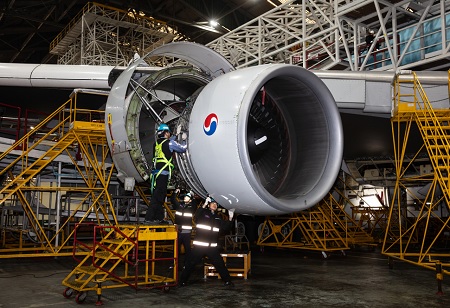
Korean Air to Launch Asia's Largest Engine Maintenance Cluster by 2027

 Korean Air has commenced the development of a pioneering aircraft engine maintenance hub situated near Incheon International Airport, specifically in Unbuk, set to debut in 2027. As the largest facility of its type in Asia, this cluster is designed to greatly augment Korean Air's prowess in aircraft engine maintenance, cementing its position in the aviation Maintenance, Repair, and Overhaul (MRO) industry.
Korean Air has commenced the development of a pioneering aircraft engine maintenance hub situated near Incheon International Airport, specifically in Unbuk, set to debut in 2027. As the largest facility of its type in Asia, this cluster is designed to greatly augment Korean Air's prowess in aircraft engine maintenance, cementing its position in the aviation Maintenance, Repair, and Overhaul (MRO) industry.
On March 14, the cornerstone of this ambitious endeavor was laid in a ceremony graced by distinguished personalities including Walter Cho, Korean Air's Chairman and CEO, alongside prominent figures from both political and corporate realms, emphasizing the significance of this venture. Walter Cho reiterated the pivotal role of engines in ensuring aviation safety and Korean Air's unwavering dedication to upholding the highest safety benchmarks. He emphasized the project's objective of fortifying Korea's standing in the specialized aviation domain, highlighting the strategic importance of this initiative.
Spanning seven floors and covering over 140,000 square meters, the proposed facility entails a 578 billion won investment. Kolon Global has been assigned the construction of this expansive complex strategically positioned adjacent to Korean Air's established Engine Test Cell (ETC), which has been operational since 2016. This prime location is aimed at optimizing engine maintenance procedures by consolidating all phases of engine care into a single centralized hub, thereby improving efficiency and operational efficacy.
Beyond merely expanding physical infrastructure, this growth represents a substantial advancement in the airline's engine maintenance capability, targeting the servicing of 360 engines annually, a notable rise from the current capacity of 100 engines. This encompasses a wider array of engine models, incorporating GE’s GEnx, CFMI’s LEAP-1B, and potentially the Rolls-Royce Trent XWB utilized in Asiana Airlines’ Airbus A350s.
Expected to generate more than 1,000 new employment opportunities, the project will bolster the competitiveness of the domestic aviation Maintenance, Repair, and Overhaul (MRO) sector while diminishing dependence on overseas maintenance services. Korean Air's commitment emphasizes its distinctive status as the exclusive operator of specialized civilian aircraft engine overhaul facilities in Korea, tracing back to its inception with Boeing 707 engine overhauls in 1976.
Having overhauled nearly 5,000 engines to date and servicing clients ranging from subsidiaries like Jin Air to global carriers such as Delta Air Lines and China Southern Airlines, Korean Air's maintenance standards have earned widespread recognition. The airline possesses airworthiness certifications from 13 domestic and international authorities, showcasing its dedication to upholding and surpassing global aviation safety and efficiency standards. This upcoming engine maintenance cluster signifies a significant stride for both Korean Air and the broader aviation sector in Asia.

